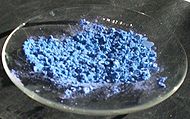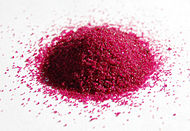- Hydrate
-
Hydrate is a term used in inorganic chemistry and organic chemistry to indicate that a substance contains water. The chemical state of the water varies widely between hydrates, some of which were so labeled before their chemical structure was understood.
Contents
Chemical nature of hydrates
Organic chemistry
In organic chemistry, hydrate is a compound formed by the addition of water or its elements to another molecule. For example, ethanol, CH3–CH2–OH, can be considered as a hydrate of ethene, CH2=CH2, formed by the addition of H to one C and OH to the other C. A molecule of water may be eliminated, for example by the action of sulfuric acid. Another example is chloral hydrate, CCl3–CH(OH)2, which can be formed by reaction of water with chloral, CCl3–CH=O.
Molecules have been labeled as hydrates for historical reasons. Glucose, C6H12O6, was originally thought of as C6(H2O)6 and described as a carbohydrate, but this is a very poor description of its structure as known today. And methanol is often sold as “methyl hydrate”, implying the incorrect formula CH3OH2, while the correct formula is CH3–OH.
Many organic molecules, as with inorganic molecules, form crystals that incorporate water into the crystalline structure without chemical alteration of the organic molecule (water of crystallization). The sugar trehalose, for example, exists in both an anhydrous form (melting point 203°C) and as a dihydrate (melting point 97°C). Protein crystals commonly have as much as 50% water content.
Inorganic chemistry
Hydrates are inorganic salts "containing water molecules combined in a definite ratio as an integral part of the crystal"[1] that are either bound to a metal center or that have crystallized with the metal complex. Such hydrates are also said to contain water of crystallization or water of hydration. If the water is heavy water, where the hydrogen involved is the isotope deuterium, then the term deuterate may be used in place of hydrate.


Anhydrous
cobalt(II) chloride
CoCl2Cobalt(II) chloride
hexahydrate
CoCl2·6H2OA colorful example is cobalt(II) chloride, which turns from blue to magenta (red) upon hydration, and can therefore be used as a water indicator.
The notation of hydrous compound · nH2O, where n is the number of water molecules per formula unit of the salt, is commonly used to show that a salt is hydrated. The n is usually a low integer, though it is possible for fractional values to exist. In a monohydrate n is one, in a hexahydrate n is 6 etc. (typical prefixes are mono, di, tri, tetra, penta, hexa, hepta, octa, nona, deca). Such water is also referred to as water of crystallization. Examples include borax decahydrate and chalcanthite.
A hydrate which has lost water is referred to as an anhydride, and can normally lose further water only upon strong heating, if at all. A substance that does not contain any water is referred to as anhydrous. Some anhydrous compounds are hydrated so easily that they are said to be hygroscopic and are used as drying agents or desiccants.
Clathrate hydrates
Main article: Clathrate hydrateGas hydrates are clathrate hydrates (a class of solid hydrates of gases): water ice with gas molecules trapped within. When the gas is methane it is called a methane hydrate.
Nonpolar molecules such as methane can form clathrate hydrates with water, especially under high pressure. Although there is no hydrogen bonding of water molecules when methane is the guest molecule of the clathrate, guest-host hydrogen bonding often forms with guest molecules in clathrates of many larger organic molecules, such as tetrahydrofuran. In such cases the guest-host hydrogen bonds result in the formation of L-type Bjerrum defects in the clathrate lattice.[2]
Stability
The stability of hydrates is generally determined by the nature of the compounds, their temperature, and the relative humidity (if they are exposed to air).
See also
- Deliquescent
- Efflorescent
- Hydrated Ionic Compound
- Hygroscopic
- Mineral hydration
- Water of crystallization
References
- ^ "Hydrate". Farlex, Inc (TheFreeDictionary.com). http://www.thefreedictionary.com/hydrate. Retrieved 2009-07-08.
- ^ Alavi S, Susilo R, Ripmeester JA (2009). "Linking microscopic guest properties to macroscopic observables in clathrate hydrates: guest-host hydrogen bonding" (PDF). The Journal of Chemical Physics 130 (17): 174501. doi:10.1063/1.3124187. PMID 19425784. http://scitation.aip.org/getpdf/servlet/GetPDFServlet?filetype=pdf&id=JCPSA6000130000017174501000001&bypassSSO=1. (free abstract)
Categories:- Hydrates
- Oxygen compounds
- Hydrogen compounds
Wikimedia Foundation. 2010.
